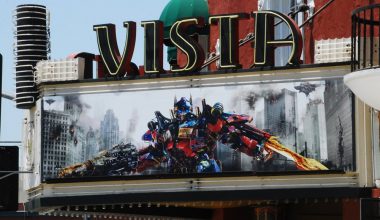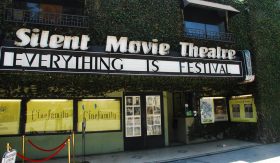Regularly pulling together 39 students spread across three classes in Los Angeles can sometimes be a logistical impossibility. For nine weeks during the summer, the students in the Elon in LA program have to focus on their internships, class projects and other responsibilities. In essence, they build their own lives out west, if only a couple of months.
But program coordinator J. McMerty and his alumni assistants, Beatrice Copeland ’12 and Jeff Masters ’12, work hard to organize optional, extracurricular activities that are both enriching and entertaining for the students and that allow them to gather as one larger group.
Perhaps the most popular of the optional events is the weekly movie night. On Wednesdays, all students have the opportunity to attend a movie at a theater that changes every week. And for the undergrads in the program, being exposed to different movie genres, enjoying several theater environments and maintaining even the loosest of connections to their peers is important.
“I look forward to the movie nights every week because I get to see a new part of Los Angeles, I find good theaters to go to, and I get to see everyone that signs up to go, which is a majority of the students,” says junior media arts & entertainment major Will Anderson. “It’s nice because you’d think we’d get to see each other most of the time, but we don’t because we work all the time.”
Liv Dubendorf, a senior media arts & entertainment major, said the LA movie night puts her in a seat to watch movies she wouldn’t otherwise see on her own.
“What I like about it is that you get to see movies that you wouldn’t necessarily go see,” she says. “The movies I can drag my friends to see are ‘Transformers’ and ‘Green Lantern.’ But we go see movies that are less about budget and more about storytelling. We’ve seen interesting movies that are thought provoking in really awesome theaters.”
So far this summer, students have seen “Super 8,” “Beginners,” “Tree of Life,” “Buck” and Laurel and Hardy silent films. McMerty says he tries to stay away from blockbusters, opting instead for wide variety of genres—comedies, dramas, experimental films, documentaries. He also likes to find films that might only be screening in Los Angeles.
“The thought behind it was in a major city where you can see films that aren’t released anywhere else and being in the heart of the entertainment capital of the world, it’s important that students have the opportunity to see films,” he says. “In a time where less people watch films collectively, I think it’s important that students have the experience of seeing a movie in big crowd. It creates a different kind of film experience.”

And that film experience changes from week to week, as students enjoy films at different theaters. One week they may be at the Arclight, a traditional multiplex. Another week, they may head to the Vista, which houses just one screen and, thus, one film. And still another week, they may be at the Silent Theatre. The theater hopping only adds to the movie-watching adventure, McMerty says.
“It’s important that entertainment students of all kinds see films in historic theaters like Grauman’s (Chinese Theater) or the Vista to have a background on film theaters in Los Angeles,” he says.
Dubendorf agrees, saying that the theater experience is just as important as the movie itself. She thinks the environment in which she watches a film can change her perception of the piece, so she looks forward to learning about where she’ll be going for the weekly Wednesday night flick.
“We’ve been going to movie palaces,” she says. “I’ve always associated Los Angeles with movies, so to be at the center of that culture, where the public meets the profession, that to me is more important than the actual production. It’s about how the public perceives the movie. To see how a theater changes your experience has been interesting. It turns into something more than just watching a film.”



